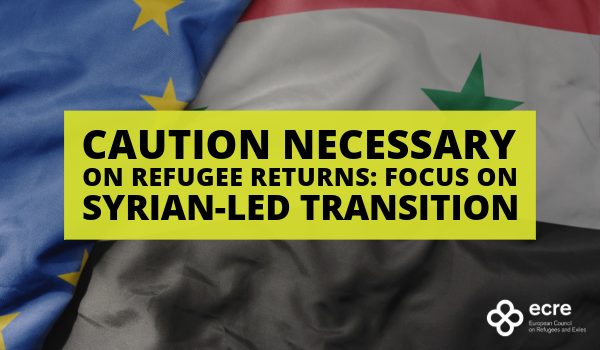By Catherine Woollard
Developments in Syria are welcome and the fall of al-Assad may open the door for return of refugees from Europe – eventually. However, there is a risk that European states prematurely revoke protection for Syrian refugees in Europe, in a rush to return people before the country is safe.
As the European Commission has also underlined: it’s too early to be talking about return.
Let Syrians celebrate the overthrow of the al-Assad regime and wait to see how transition progresses.
EU and international law have strict rules on the cessation of international protection status which must be respected. For example, the changes in the country of origin have to be significant and non-temporary.
The United Nations Refugee Agency (UNHCR) has also added that return should only take place when it can be shown that the situation creating the need for protection has changed in ways that are “fundamental, durable and stable”.
Many refugees from Syria will wish to go back – but return from Europe has to be managed in a cautious way. It is incumbent upon states to ensure that return takes place only when it is durable and when safety can be guaranteed.
Sound analysis of the situation on the ground will be essential, in a policy area where evidence is frequently ignored. In the last six months, European states even suggested normalising relations with the brutal al-Assad regime in a desperate effort to return people. Going forward, as well as supporting the transition, the EU should ensure that member states’ decisions on refugee return comply with the requirements of EU and international law.
It should be noted that actions taken by EU member states thus far do not involve suspension of asylum or removing status – both of which would be unlawful at this stage. So far, some states are postponing examination of asylum applications already in their systems.
Freezing applications was hardly priority for day one, but it is a measure allowed by EU law in some circumstances.
The states in question have invoked Article 31(4) of the Asylum Procedures Directive which allows postponing examination due to “uncertain situation in country of origin which is expected to be temporary” – although conditions apply.
Inaccurate reporting on the measures taken – and nasty hyperbole from ministers – is unhelpful and may generate panic.
Going forward, the EU should support peace and justice in Syria, through supporting Syrians to manage an inclusive transition.
But the EU should also ensure that member states’ decisions on refugee return comply with the requirements of EU and international law.
ECRE urges the European Commission to rapidly issue guidance on what is and is not allowed under the current circumstances.
Related article

